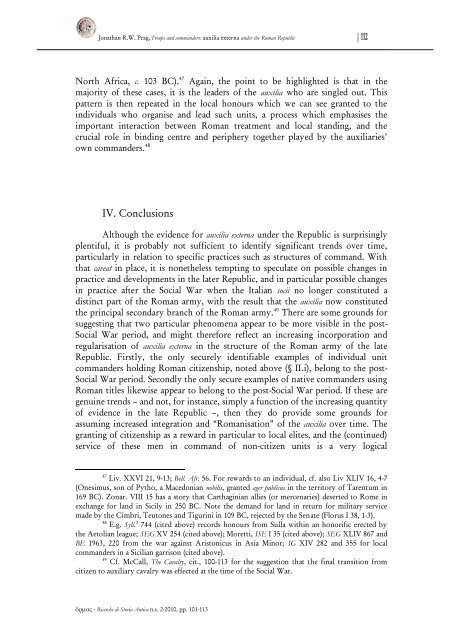n.s. 2-2010 - Societa italiana di storia militare
n.s. 2-2010 - Societa italiana di storia militare
n.s. 2-2010 - Societa italiana di storia militare
You also want an ePaper? Increase the reach of your titles
YUMPU automatically turns print PDFs into web optimized ePapers that Google loves.
Jonathan R.W. Prag, Troops and commanders: auxilia externa under the Roman Republic | 112<br />
North Africa, c. 103 BC). 47 Again, the point to be highlighted is that in the<br />
majority of these cases, it is the leaders of the auxilia who are singled out. This<br />
pattern is then repeated in the local honours which we can see granted to the<br />
in<strong>di</strong>viduals who organise and lead such units, a process which emphasises the<br />
important interaction between Roman treatment and local stan<strong>di</strong>ng, and the<br />
crucial role in bin<strong>di</strong>ng centre and periphery together played by the auxiliaries’<br />
own commanders. 48<br />
IV. Conclusions<br />
Although the evidence for auxilia externa under the Republic is surprisingly<br />
plentiful, it is probably not sufficient to identify significant trends over time,<br />
particularly in relation to specific practices such as structures of command. With<br />
that caveat in place, it is nonetheless tempting to speculate on possible changes in<br />
practice and developments in the later Republic, and in particular possible changes<br />
in practice after the Social War when the Italian socii no longer constituted a<br />
<strong>di</strong>stinct part of the Roman army, with the result that the auxilia now constituted<br />
the principal secondary branch of the Roman army. 49 There are some grounds for<br />
suggesting that two particular phenomena appear to be more visible in the post-<br />
Social War period, and might therefore reflect an increasing incorporation and<br />
regularisation of auxilia externa in the structure of the Roman army of the late<br />
Republic. Firstly, the only securely identifiable examples of in<strong>di</strong>vidual unit<br />
commanders hol<strong>di</strong>ng Roman citizenship, noted above (§ II.i), belong to the post-<br />
Social War period. Secondly the only secure examples of native commanders using<br />
Roman titles likewise appear to belong to the post-Social War period. If these are<br />
genuine trends – and not, for instance, simply a function of the increasing quantity<br />
of evidence in the late Republic –, then they do provide some grounds for<br />
assuming increased integration and “Romanisation” of the auxilia over time. The<br />
granting of citizenship as a reward in particular to local elites, and the (continued)<br />
service of these men in command of non-citizen units is a very logical<br />
47 Liv. XXVI 21, 9-13; Bell. Afr. 56. For rewards to an in<strong>di</strong>vidual, cf. also Liv XLIV 16, 4-7<br />
(Onesimus, son of Pytho, a Macedonian nobilis, granted ager publicus in the territory of Tarentum in<br />
169 BC). Zonar. VIII 15 has a story that Carthaginian allies (or mercenaries) deserted to Rome in<br />
exchange for land in Sicily in 250 BC. Note the demand for land in return for military service<br />
made by the Cimbri, Teutones and Tigurini in 109 BC, rejected by the Senate (Florus I 38, 1-3).<br />
48 E.g. Syll. 3 744 (cited above) records honours from Sulla within an honorific erected by<br />
the Aetolian league; SEG XV 254 (cited above); Moretti, ISE I 35 (cited above); SEG XLIV 867 and<br />
BE 1963, 220 from the war against Aristonicus in Asia Minor; IG XIV 282 and 355 for local<br />
commanders in a Sicilian garrison (cited above).<br />
49 Cf. McCall, The Cavalry, cit., 100-113 for the suggestion that the final transition from<br />
citizen to auxiliary cavalry was effected at the time of the Social War.<br />
ὅρμος - Ricerche <strong>di</strong> Storia Antica n.s. 2-<strong>2010</strong>, pp. 101-113

















